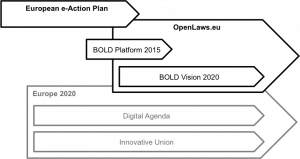VoxPopuLII
| Rough Consensus, Running Standards: The Restatement Project | Designing Legal Communications that Resonate |
openlaws
The other day a friend came to me because he heard about the openlaws.eu project. He said: “Hey, openlaws sounds great – does that mean that I can write my own laws now?”. I had to tell him no, but that it was almost as good as that…
So what is openlaws then? openlaws aims at opening access to existing legal information systems and proactively involving and integrating its target groups, i.e. communities of individuals and businesses, legal professionals and public bodies. Open innovation, mass customization, big data analysis, social features and social networks are already highly successful in other markets and we want to introduce them in the legal domain on a European scale. Based on open data, open source software and open innovation principles the project adds a “social layer” to the existing “institutional layer” of legal information systems.
Or to keep it simple: openlaws will help you find legal information more easily, organize it the way you want and share it with others.
EU Project
openlaws is an EU project which is co-financed by the European Union. It was ranked by DG Justice #1 among almost 100 submitted proposals from institutions all over Europe. The project started in April 2014 and will last until March 2016. The two main objectives of openlaws are:
- To create a clear BOLD Vision 2020 about what Big Open Legal Data (BOLD) could do in the year 2020 and propose a roadmap to the European Commission / DG Justice to implement it.
- To build a BOLD ICT Platform, based on open source software, which will be the first step to combine legal content and the knowledge and feedback of the community.
The endeavour will help Europe to innovate in the legal field, provide better access for individuals, businesses, legal experts and public bodies, and create a network between them. openlaws is in line with the European e-Justice Action Plan and the Europe 2020 growth strategy, including the Digital Agenda and the Innovative Union.

The following institutions participate in the project as the core team:
- University of Amsterdam
- Salzburg University of Applied Sciences
- University of Sussex
- London School of Economics
- Alpenite srl
- BY WASS GmbH
However, following an open innovation approach, other institutions and individuals are invited to join the openlaws initiative and to contribute to this “social layer” for legal information.
So what is the problem?
Legal texts are basic information of all democratic states. As such legal information must be accessible to all members of society to the widest possible extent, to aid inclusiveness and to enable participation in public decision-making. In recognition of this, the EU and its Member States work to make laws, court decisions, etc, publicly available on line. Much has been achieved locally already. However, the sheer mass of legal norms, instruments and interpretations in courts decisions, commentaries and other sources, makes it increasingly difficult for citizens, civil society, businesses and all involved in legal practices to locate the relevant law. The challenge for the future is to link local legal information and have in place structures to enrich it through aggregation and mass customization. The technological possibilities to achieve this are there. Openlaws.eu aims to initiate a platform and develop a vision for Big Open Legal Data (BOLD): an open framework for legislation, case law, and legal literature from across Europe. This contributes to better access to legal information and ultimately to better governance, both of which support higher social welfare goals.
Today, a huge amount of legal information remains published and administered by a limited number of organizations, typically in closed structures in public authorities and public-private partnerships. This includes the management of legal metadata, which is the basis for automated processing. Legal scholars and practitioners publish mainly through traditional, highly specialized, commercial publishing or isolated websites. Back-channels are limited, and there is little space for contributions from wider communities. Fully automated processing of legal data is not yet possible. Strikingly, whereas in many domains such as statistics, spatial information, and life sciences research data, open information infrastructures are rapidly developing, this is not the case for legal information. This project’s aim is to help build and promote an open ICT environment (using existing tools and sources, like EUR-Lex, the European e-Justice System, e-Codex, national databases, etc.) so that all stakeholders can benefit from it (e.g. additional metadata, data curation, etc.).
The target groups for openlaws are:
- Individuals and Businesses: 500 million EU citizens and 21 million businesses are all affected by laws. Their interests: laws made more accessible and understandable, e.g. through mass-customization.
- Legal experts: 500 thousand expert legal practitioners have to deal with an ever-increasing amount of legal information, emanating from the EU, national, regional and sectoral sources. Their interests: better access to legal information from the EU and its Member States, leading to more productivity and more harmonization.
- Public bodies: 27+ EU Member States with 23+ official languages have to manage, interpret and disseminate legal texts. Their interests: Economies of scale and affordable powerful ICT solutions, enabling interactivity and integration.
The following activities are planned to be done by the openlaws core team until March 2016:
- We will do a comparative analysis of law, society and institutional developments towards the open access model, past developments and prognosis for the future.
- We will perform a socio-economic and technical analysis in order to propose a framework where different stakeholders can cooperate in an open access environment.
- We will develop and launch the BOLD ICT Platform for desktops, tablets and smartphones with open interfaces, interlinking open data (selected Member States and EU level), and add personalization and social web features to it, like highlighting, tagging, commenting, rating, sharing, publishing, etc.
- We will engage the community so that they contribute to OpenLaws.eu and the BOLD ICT Platform by building social networks, sharing legal content, creating new content and metadata, etc. and we will disseminate our findings at conferences, in meetings, in scientific papers and in social media campaigns, and organize events in various EU Member States to raise awareness.
In the first phase, the core team will integrate databases from the EU, the UK, the Netherlands and from Austria. It will be possible to connect also databases from other countries via open interfaces (APIs). If you have a suggestion for a database that should be included, please contact us. Of course, it would be great if you could help us with the integration of such database!
Adding a social layer to existing databases
openlaws will enable users to assert their rights throughout the EU by making access to justice much easier and more open by adding a “social layer”:

- Mass customization will make it possible to define individual bookmarks, folders, create highlights, tags, comments, and alert functions, and share this with others.
- A legal meta-search across multiple databases will make it possible to search in different databases at the same time, also cross-border.
- The quantity of publicly available legal information can be increased. More legal metadata will help structure the content and will enable big data analysis. Open access publication (in combination with quality control mechanisms) will enable experts to easily publish comments, full papers, or translations – which would have been too complicated to do in the past – increasing their visibility and reputation (similar to Google Scholar or Microsoft Academic Search).
- The quality of legal information can be increased. By involving the legal expert community, metadata can not only be generated, but also curated. Ambiguities can be presented to the community for correction. The quality of papers can be increased through review processes.
- The legal network within and between the target groups will help find experts and exchange information and best practices.
- Input from individuals and businesses in law-making, the analysis of case law (#goodlaw) promises a better knowledge and understanding of law, more direct democracy, and better policy-making.
The openlaws core team
The openlaws core team members are an interdisciplinary group of universities and SMEs from leading e-government member states. The University of Amsterdam and the University of Sussex are specialized in legal informatics, comparative law and governance. The London School of Economics and Political Science will cover the socio-economic part, while the Salzburg University of Applied Science will provide the system architecture. The Italian software SME Alpenite srl and the Austrian BY WASS GmbH, who are building the Austrian mobile legal information system together, will be in charge of the implementation, the dissemination and the user community engagement.
- The Leibniz Center for Law of the University of Amsterdam develops intelligent technology to support legal practice both in the private and in the public sector. UVA’s Institute for Information Law has a wealth of experience in independent research into key regulatory areas of the information society, ranging from electronic communications, data protection, and intellectual property to fundamental communication freedoms. Combining law and ICT, and having participated in and coordinated numerous national and European (applied) research projects, UVA has been chosen as the lead partner of openlaws.
- The University of Sussex will complement UVA with its expertise in exploring governance through the perspective of citizenship and constitutions and reflection upon comparative legal systems and designs.
- The London School of Economics will focus in depth on socio-economic analysis, visions, and strategies, building a bridge between societal demands, governance, and new media and new technology.
- The Italian Alpenite srl will implement the initial BOLD ICT Platform. Alpenite was selected because of its practical experience with open source software and open data, and because it has already created an ICT framework for the Austrian mobile legal information system.
- The Salzburg University of Applied Sciences has a strong focus on software engineering, systems engineering and network technologies and will be responsible for the architecture of the BOLD ICT Platform.
- The Austrian BY WASS GmbH is the initiator of the Austrian RIS:App project and the openlaws project. BY WASS has expertise in information law, legal informatics, open data and open innovation management and will be responsible for the broad dissemination of the project.
Summary
My friend liked the idea and the concept of openlaws. Linking legislation, case law, legal literature and legal experts made sense for him. But when he wanted to see the platform, I had to tell him: “We have just started with the basic architecture of openlaws.eu and it will still take a while until a first prototype is ready…”
He looked disappointed: “So I will forget openlaws for now until it is live?” But the answer to that is: “No – get in contact with us now right at the beginning of the project! We need your ideas and your contribution and we are grateful for feedback!”
Why should you contact us?
- You are near one of the core team members and want to chat while having a coffee
- You want certain databases to be integrated in openlaws
- You have some ideas regarding the functionalities of the platform
- You have some points that are important for the future policy of the European Union in the area of law
- You can code and want to help us with the implementation and testing of the platform
- … and probably thousands of other reasons…
How can you contact us?
Dr. Clemens Wass, MBL, MBA has obtained degrees in law, business law and business administration (with a specialization on entrepreneurship and innovation). He has ten years of practical experience in the area of law and legal informatics. Before becoming self-employed at BY WASS GmbH, he has been working for the University of Salzburg at the Institute for Comparative Law and for the IT companies SONY and SKIDATA. He is external lecturer at the Vienna University of Economics and Business and has published several papers in the area of legal informatics and information law. He has published the Austria RIS:App, which is the official mobile platform to Austrian legislation:
iPhone/iPad: https://itunes.apple.com/at/app/ris-app/id517930270?mt=8
VoxPopuLII is edited by Judith Pratt. Editors-in-Chief are Stephanie Davidson and Christine Kirchberger, to whom queries should be directed.
Recent Posts
- The Balancing Act: Looking Backward, Looking Ahead
- 25 for 25: So What(‘s Next)?
- You with the law show?
- 25 for 25: City Miles, Jazz, and Beacons
- Deeply intertwingled laws
- 25 for 25: A Librarian’s Free Law Awakening
- A birthday message
- 25 for 25 – Documents to Data : A Legal Memex
- 25 for 25: Envisioning Free Access to Caselaw
- The debate on research quality criteria for legal scholarship’s assessment: some key questions






